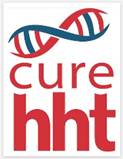What to Bring With You
- Test Results: If you've had any outside test done — CT scans, MRIs, echocardiograms, etc. — be sure to obtain these images on a computer disc and bring them with you.
- Medical Records: Make copies of your medical records and bring along.
These tests and records will help us assess you and avoid repeat testing.
What to Expect at Your First Appointment
The first step will be a complete history and physical exam.
Since HHT is an inherited disease, your family history is very important. Experts at the HHT Center will pay special attention to your family tree.
Please be sure to take some time to complete your family history table and bring it to your appointment. This will help us assess your risk for HHT.
HHT Testing and Treatment
Clinical Evaluation
The first step in your evaluation is a complete history and physical examination. Since HHT is an inherited disease, your family history is very important. Experts at the HHT Center will pay special attention to your family tree.
Please be sure to take some time to complete your family history table and bring it to your appointment. This will help us assess your risk for HHT.
Genetic Testing
If your evaluation is suggestive of HHT, we can confirm the diagnosis by drawing a blood sample and performing a genetic test.
If no one in your family has obtained a genetic diagnosis of HHT, the genetic test is costly. In most cases, your health insurer will need to approve them before they can be done. It takes up to 4-6 weeks to get the test results.
If someone in your family has already had HHT confirmed by genetic testing, we can perform a less costly genetic test from a blood sample to look for find the presence of the family HHT mutation in you.
Even though the cost for the test is less, your health insurer will still often need to approve it.
Screening for Vascular Malformations
Once we confirm that you have HHT (either by history and physical or by genetic testing), we will refer you for:
- An echocardiogram (ultrasound of the heart) to check for lung vascular malformations.
- An MRI to check for brain vascular malformations.
Referral for Treatment of Vascular Malformations
If your past or present evaluation reveals the presence of arteriovenous malformations (AVMs), we will refer you to one of one of our experts for treatment.
- If you have nose bleeding that is not well controlled by nasal humidification and lubrication, we will refer your to our ENT experts for laser treatment.
- If you have AVMs in the lung, we will refer you to in interventional radiologist for embolization, which is a blocking off of the abnormal blood vessels. This procedure is similar to a heart catheterization.
- If you have AVMs of the brain, we will refer you to neurological/neurosurgical specialist to determine the best treatment plan.
- If you have GI bleeding of AVMs of the liver, we will refer you to a gastroenterologist or hepatologist (liver specialist) to determine the best treatment.





















